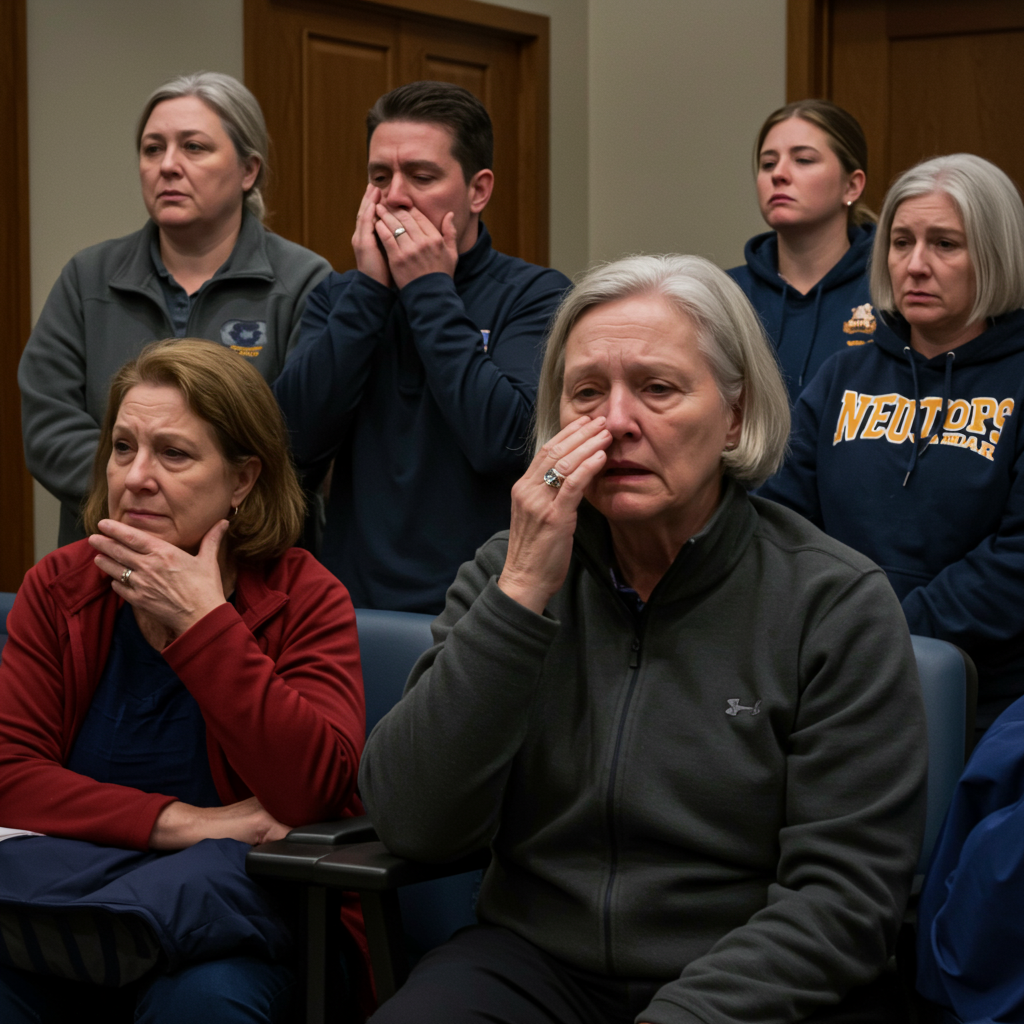The Bryan Kohberger case, involving the brutal 2022 murders of four University of Idaho students, has taken a stunning turn. Accused killer Bryan Kohberger has accepted a plea deal to avoid the death penalty. This development, emerging just weeks before the anticipated trial was set to begin, has ignited fierce reactions, particularly from the victims’ families who had passionately advocated for capital punishment. For some, the agreement feels like a profound betrayal by the very justice system they had placed their hope in.
Bryan Kohberger, 30, faced charges for the deaths of Kaylee Goncalves, Madison Mogen, Xana Kernodle, and Ethan Chapin. These four bright students were tragically killed in a Moscow, Idaho, rental home during a 4 a.m. attack on November 13, 2022. The prospect of a trial had loomed large, with extensive preparations underway, including compelling out-of-state witnesses to testify and grappling with massive volumes of evidence. Yet, that path abruptly changed with the eleventh-hour plea negotiation.
What Does Bryan Kohberger’s Plea Deal Mean?
Under the terms of the reported agreement, Bryan Kohberger will plead guilty to the four counts of first-degree murder and one count of felony burglary. In exchange for this admission of guilt, the prosecution has agreed to drop the pursuit of the death penalty. Kohberger is expected to receive four consecutive life sentences in prison without the possibility of parole. A court hearing for a formal change of plea is scheduled for Wednesday, July 2, 2025. Crucially, accepting this deal also means Kohberger must waive his right to appeal the conviction, effectively bringing a level of finality to the legal proceedings for the state.
The decision to offer and accept such a deal, especially so late in the process, involves complex considerations. Prosecutors reportedly explained their rationale to the victims’ families. While confident in their evidence, they acknowledged the inherent risks of a jury trial. These risks include the potential for a mistrial or a hung jury, outcomes that would force the families to endure the entire process again. They also highlighted the immense emotional, mental, financial, and physical burden a lengthy, high-profile trial imposes. Furthermore, death penalty cases involve mandatory, often decades-long appeal processes, potentially keeping the case in courts for 30 to 40 years. Securing a guilty plea, they argued, offers a measure of immediate certainty and avoids this prolonged uncertainty, guaranteeing Kohberger will remain imprisoned for life. Sources indicate the defense team initiated the negotiation last week.
Divergent Reactions from Victims’ Families
The news of the plea deal was met with overwhelming anguish and frustration by many of the victims’ loved ones. Kaylee Goncalves’ family, who had consistently and vocally supported the death penalty, were particularly devastated. Aubrie Goncalves, Kaylee’s 18-year-old sister, powerfully expressed the family’s reaction, stating they were sent into “panic mode” and felt “scrambling” upon receiving news of the agreement. She described the experience as “shocking and cruel,” lamenting the late timing that prevented the families from adequately processing such a possibility.
Aubrie stated unequivocally that “the system has failed these four innocent victims and their families.” The delays, the relocation of proceedings, and the overall demands of the justice process had already placed “heavy burdens” on families struggling with “unimaginable grief.” Despite trying to hold onto hope and belief in the system, she argued, this deal felt like a breaking point.
She emphasized that her sister, Madison, Xana, and Ethan were “beautiful human beings,” not just names or headlines. “They are not just ‘The Idaho Four,'” she wrote, stressing they were real people with dreams, sons, daughters, siblings, and friends who deserved justice and to be remembered for their lives. The contrast between Kohberger potentially having a future, able to speak and form relationships in prison, while their loved ones were “silenced forever,” was particularly painful. She felt the system was protecting his future more than honoring their pasts.
The Goncalves family felt “blindsided, unheard, and unsupported” by the justice system, describing the last-minute deal as an “afterthought” rather than an act of justice. They stressed they were not seeking vengeance but “accountability,” “dignity for our loved ones,” and a system that truly fulfills its promise. The family revealed they had met with prosecutors on Friday, and while a plea possibility was vaguely mentioned, their response was a firm “hard no.” The majority of that conversation focused on trial preparation. An email received late Sunday night triggered their “panic mode,” leading to urgent calls and emails. Despite meeting again with prosecution on Monday to reiterate their demand for the death penalty, they felt their “efforts did not matter,” stating they “lost the war” despite fighting harder than imaginable. Steve Goncalves, Kaylee’s father, reportedly felt “beyond furious,” believing the state had returned power to Kohberger and that the deal was “anything but justice.” He characterized prison as “adult child care.”
A Different Perspective on the Outcome
While many victims’ families expressed anger, the outcome was viewed differently by at least one. Ben Mogen, the father of Madison Mogen, reportedly welcomed the plea deal. He stated that it would help his family “put this behind us” and begin moving forward without the constant stress of court dates and trial proceedings. Unlike those who sought the death penalty, he expressed a preference for Kohberger receiving life in prison without parole. His reasoning was that a life sentence would give Kohberger decades to contemplate his actions, potentially seeing this as a more prolonged form of accountability than a swift execution. This highlights the complex and deeply personal nature of seeking justice and closure for families impacted by such horrific crimes.
Context Leading to the Plea Agreement
The plea deal emerges from a case marked by intense public scrutiny and meticulous legal maneuvering. Kohberger, a graduate student studying criminology at Washington State University just miles from Moscow, Idaho, was arrested in Pennsylvania over a month after the killings. Key evidence cited included DNA found on a knife sheath near one victim, cell phone data, and surveillance footage of his white Hyundai Elantra.
The legal process had been moving towards a highly anticipated trial. Previously, the judge had granted a change of venue, relocating the trial from Latah County to Boise, Idaho, acknowledging that extensive pre-trial publicity had likely tainted the local jury pool. The trial had faced several delays, most recently pushed back with opening arguments expected in mid-August 2025. The defense had requested delays citing, in part, the enormous volume of evidence requiring review—reportedly 68 terabytes. Pre-trial hearings were ongoing, including a Pennsylvania judge recently ordering several defense witnesses, including a childhood acquaintance and a boxing trainer, to travel to Idaho to testify for the defense. These steps underscore the extensive, detailed preparation that was well underway before the sudden shift to a plea agreement. Kohberger had previously entered a plea of not guilty after remaining silent during his arraignment.
Legal analysts have described the plea deal as a “huge win” for the defense, particularly given the amount of evidence prosecutors had indicated they possessed. While prosecutors assert the deal is a “sincere attempt to seek justice,” ensuring conviction and life imprisonment while avoiding decades of appeals, concerns have been raised by analysts about the process if it occurred without the full consent or consultation of all families involved.
The emotional toll on the victims’ families throughout this process cannot be overstated. Their journey has been marked by profound loss, public attention, and now, unexpected legal turns. While the state aims for legal finality through the plea, the families’ raw reactions underscore the vast difference between the formal justice system and the personal, enduring quest for true accountability and dignity for their loved ones.
Frequently Asked Questions
Why did Bryan Kohberger accept a plea deal in the Idaho student murders case?
Bryan Kohberger accepted a plea deal primarily to avoid the death penalty, which prosecutors were seeking. By pleading guilty to the four counts of first-degree murder and one count of burglary, he secured a sentence of life in prison without the possibility of parole. The defense initiated the negotiation. Prosecutors agreed, citing reasons such as avoiding the risks of a jury trial (like a mistrial), ensuring a guaranteed conviction and life sentence, preventing decades of post-conviction appeals inherent in death penalty cases, and offering a measure of legal finality.
How did the victims’ families react to Bryan Kohberger accepting the plea deal?
Reactions from the victims’ families were varied but often strongly negative. The family of Kaylee Goncalves, who supported the death penalty, expressed extreme anger and devastation. They described feeling “panic mode,” “blindsided,” and believing the justice system had “failed” them. Kaylee’s sister called the deal “shocking and cruel,” while her father felt it was “anything but justice.” The aunt of Xana Kernodle also expressed fury and stated her family wanted a trial. In contrast, Ben Mogen, Madison Mogen’s father, welcomed the deal, viewing it as a way to find closure and preferring life imprisonment so Kohberger would have decades to contemplate his actions.
What happens next now that Bryan Kohberger has accepted a plea deal?
The next step is a formal court hearing, reportedly scheduled for Wednesday, July 2, 2025, where Bryan Kohberger is expected to formally enter his guilty plea. Upon the judge accepting the plea, he would be sentenced to life in prison without parole for the murders. A key aspect of the deal is that he must waive his right to appeal the conviction. This means the long-anticipated trial will not occur, and the state’s legal process regarding the conviction is intended to conclude, though the emotional impact on the families will undoubtedly continue.
The scheduled change of plea hearing represents a pivotal moment, potentially bringing a formal end to the court case before a trial could ever begin.
Word Count Check: 1147



